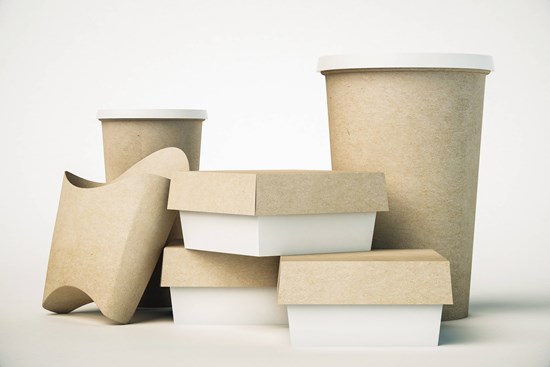Could Finnish forest technology turn the tide of plastic packaging

Each person in the EU generated 34.4kg of plastic packaging waste* in the last decade, of which less than half (14.1kg) was recycled. As a result, more than six in 10 consumers** have cut back on their single-use plastic, showing they are increasingly demanding more sustainable packaging options for the goods they purchase.
Along with falling consumer demand, the supply of plastic for goods has also been impacted by the current unstable geopolitical climate, leading prices for recycled polyethylene terephthalate (PET) to almost double in 2021. Therefore, it is more important than ever for packaging suppliers to adopt products from more efficient and sustainable materials to turn the tide on plastic packaging waste.
Many new packaging material initiatives have been developed by Finland-based companies to lead the charge. One such start-up, Paptic, produces material for various packaging applications like retail shopping bags, e-commerce mailers, and product packaging from renewable wood fibers. The global e-commerce market is forecast to reach a projected value of $98.2 billion by 2025. As those goods reach homes around the world, so too does the protective packaging surrounding them, so a shift away from plastic is essential. The main raw material of Paptic® material is wood from sustainably managed Finnish forests. For example, the bags made of Paptic® are durable and reusable by the end consumer, as well as easy to recycle with packaging papers and cardboard.
“Paptic was founded to address one of the largest global environmental challenges, the plastic waste accumulating in the environment,” says Tuomas Mustonen, CEO and Co-Founder, Paptic Ltd. “Our R&D focuses on sustainable and bio-based raw materials, to deliver the best possible packaging material properties, that will deliver quality to the user and contribute to decarbonization, supporting circular business models, and enhancing fiber circulations. We started the industrial-scale production of sustainable Paptic® material in 2018.”
Similarly, another brand, RePack delivers reusable packaging services for online retailers in Europe and North America. RePack’s award-winning reusable bags and boxes fold into letter size when empty and can be returned via any postbox, anywhere in the world, free of charge. RePack provides turnkey solutions for online retailers as well as packaging rental services for closed-loop environments in rental and re-commerce. RePack customers include Inditex, Decathlon and hundreds of smaller fashion brands.
One ground-breaking company delivering sustainable packaging solutions is Huhtamaki – a global provider of innovative products to protect on-the-go and on-the-shelf food and beverages with 100 years of history. Huhtamaki recently partnered with Unilever to transition the packaging for their Carte D’Or ice cream range to recyclable paper tubs and lids. The move to recyclable paper-based packaging, which uses 93% less plastic per tub, will help the brand eliminate more than 900 tonnes of virgin plastic in the UK annually.
Another recent innovation is Push Tab® blister lid, a first-to-market, aluminum-free, mono-material PET blister lidding for the global healthcare industry. It is designed as part of Huhtamaki’s blueloopTM product portfolio of sustainable, flexible solutions fit for existing recycling streams in food, beverage, healthcare and other categories.
“Billions of people use food packaging every day. It plays a fundamental role in ensuring food hygiene and safety, driving accessibility and affordability, and helping prevent food waste. We seek to shape the sustainable future of everyday life delivering retailers and consumers with the future-proof and sustainable packaging solutions they need to protect food, people and the planet,” says Thomasine Kamerling, EVP Sustainability and Communications at Huhtamaki.
Outi Suomi, Head of the Bio and Circular Finland program from Business Finland, Finland’s trade, investment and travel promotion and innovation funding organization, says: “Consumers rely on packaging for convenience and protection of their goods, but now they are demanding more sustainable options so they can do their bit to protect the planet. Suppliers must respond by adopting bio-material offerings along with their existing fossil-based packaging to offer the best, and most sustainable solutions for their customers.”
“Finland as a nation has set high environmental and carbon neutrality goals, aiming to be the first fossil-free welfare society by 2035. Our future-looking industries have responded by developing a high level of green research and technology know-how – including biomass packaging. With these innovative approaches to material design, we are aiming to make the transition from linear to circular material flow. Finland’s businesses are leading the way to the future of packaging by developing innovative plastics and durable natural materials that are sustainable, bio-based, bio-degradable and recyclable,” continues Suomi.
Three-quarters of Finland’s landmass is forest, and Finland’s wood-based industries have paired long-held forestry traditions with innovative new uses for the timber industry. Strong R&D programmes have created a unique offering in recycling processes and bio-based solutions, such as using wood pulp and fiber to create new materials.
R&D in Finland covers the complete value chain from PEFC-certified forests to implementation-ready applications as well as recycling and reuse of wood fibers.
4everPack Project, initiated by VTT Technical Research Centre of Finland, and the University of Vaasa, is focused on reusing consumer packaging to lower the environmental footprint of the packaging value chain. The project consortia include a large group of companies interested in exploring opportunities to replace single-use FMCG packaging with reusable solutions. Research at 4everPack is multidisciplinary and considers material solutions, packaging monitoring and traceability, logistic solutions, consumer acceptance, and circular business models together with sustainability evaluations.
**Changes and key findings in sustainability and consumer behaviour in 2021
Contact information
Outi Suomi, Head of Bio and Circular Finland program, Business Finland
outi.suomi (at) businessfinland.fi
Mia Eloranta, PR & Media Manager, Business Finland
mia.eloranta (at) businessfinland.fi
Business Finland is the Finnish government organization for innovation funding and trade, travel and investment promotion. Business Finland’s over 700 experts work in over 40 offices globally and in 16 regional offices around Finland. Business Finland is part of the Team Finland network. www.businessfinland.fi